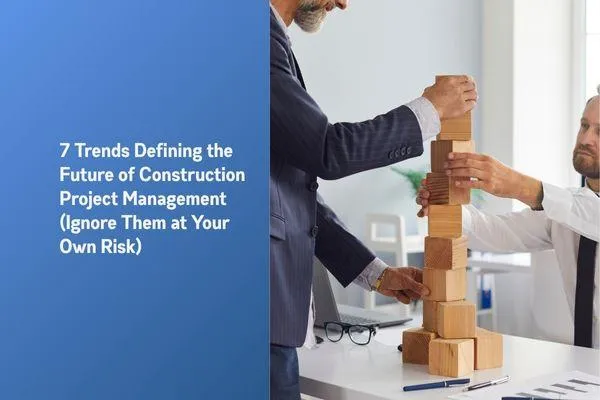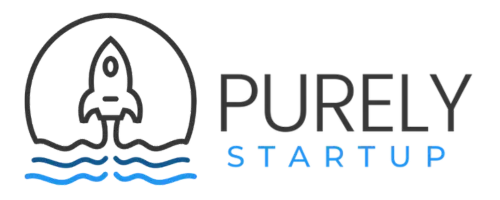
7 Trends Defining the Future of Construction Project Management (Ignore Them at Your Own Risk)
Construction project managers face increased pressure from tight deadlines, labour shortages, rising costs, and the need for constant coordination among teams, suppliers, and stakeholders. Staying on track and under budget can feel like an uphill battle. That’s why many in the industry are looking for smarter, faster ways to work.
AI is the future of construction project management. It’s transforming how projects are planned, executed, and delivered. From predictive scheduling to automated reporting, AI helps reduce manual work, improve accuracy, and speed up decision-making. It’s no surprise that 91% of small businesses are already using AI to boost productivity, and construction is quickly catching up.
In this blog post, we’ll explore the key trends shaping the future of construction project management and how these innovations can help you build more efficiently and get ahead of the curve.
7 Trends Defining the Future of Construction Project Management (Ignore Them at Your Own Risk)
What Does Construction Project Management Look Like?
Top Trends in Construction Project Management
AI in Construction is Your Virtual Assistant on Site
Smart Chatbots for On-Site Support
RPA (Robotic Process Automation)
Predictive Analytics and Risk Management with AI
AI-Powered Equipment and Robots
Building Information Modelling (BIM)
Project Planning and Optimization with Task Management Software
Sustainable Construction Project Management Practices
Challenges of Using AI in Construction Project Management
Limited Connectivity on Job Sites
Dependence on Electricity and Infrastructure
What Does Construction Project Management Look Like?
Construction project management is the backbone of a successful build. With proper management, teams stay on track, on budget, and on time. At its core, it involves planning, coordinating, and overseeing every phase of a project.
Here’s what it typically includes:
Project Planning includes creating timelines, allocating resources, and setting milestones.
Budget Management involves controlling costs, tracking expenses, and preventing overruns.
Team Coordination to ensure smooth communication between contractors, architects, and clients.
Risk Management to identify potential delays or issues before they impact the schedule.
Quality Control to ensure every phase meets industry standards and safety regulations.
7 Top Trends in Construction Project Management
The future of construction project management is now changing faster than ever. In light of the current demand for tight deadlines, increasing safety requirements, and rising costs, you can certainly say that project managers are compelled to work smarter than ever.
Thankfully, technology has been a huge support. New tools and digital systems are now helping construction teams complete their projects in less time, with high quality, and ensuring safety.
The improvements in construction planning, work, and delivery are occurring due to numerous technological trends, including AI, robotics, and sustainability. A project manager of either a high-rise structure or a housing development must understand these key shifts to stay ahead.
AI in Construction is Your Virtual Assistant on Site
The future of construction project management involves having an assistant who never sleeps, is a quick learner, and helps you identify issues before they can become costly problems.
Project managers are finding it increasingly difficult to envision their profession without the implementation of AI tools by 2025. These tools do not come as fancy tech but rather save time, cut costs, and reduce project risks.

Here's how AI challenges the status quo:
Smart Chatbots for On-Site Support
AI chatbots are now able to help workers and managers on the construction site. Need to check the delivery schedule for the concrete? Talk to the bot. Want to make sure the safety checklist for today? The chatbot will cover it instantly.
Predictive Scheduling
AI systems analyze historical project data and current progress to warn you when you’re falling behind. The AI makes an early assessment of the likely impact of weather or delivery delays on your timeline, allowing you to adjust quickly.
RPA (Robotic Process Automation)
This is AI bots doing all the boring stuff like logging inspection reports, updating project dashboards, and sending out daily updates. No more spending hours with manual data entry!
Safety Monitoring
AI cameras and sensors watch the entire place all the time, like a safety officer who is always looking for potential dangers on the site. They are designed to identify whether a person is wearing no safety headgear or is too close to hazardous parts of the machine.
Predictive Analytics and Risk Management with AI
Nobody desires surprises at a construction site. Predictive analytics saves project managers from facing them.
This trend involves analyzing data to identify potential dangers before they can become real threats. It may be termed the "early warning system." The predictive analytics tool can assess the threat using a combination of historical data, weather forecasts, supplier reliability, and worker attendance patterns.
They can:
Flag delays before they happen.
Warn if your project is going over budget.
Suggest when to order materials to avoid downtime.
Alert you to potential safety incidents.
For instance, if delays have been associated with a certain vendor in previous projects, your system may recommend switching suppliers or applying a time buffer around those deliveries. That, in turn, empowers you to make informed decisions at the front end, not when it's too late.
Predictive analytics will continue to be a defining tool in the future of construction project management, helping managers prevent problems before they occur.
AI-Powered Equipment and Robots
Robots don't belong just to the automobile manufacturing industry. Currently in construction, automation has taken over repetitive and hazardous tasks, allowing people to focus on more skilled jobs.
You’ll now find:
Brick-laying robots that build walls faster and more accurately.
Drones are surveying sites and inspecting hard-to-reach places.
Self-driving bulldozers and graders that follow digital maps.
Rebar-tying machines that reduce strain injuries.
The scope of these provisions does not replace human labour; the intent is to make workers smarter, faster, and safer.
For example, rather than climbing up scaffolding to inspect a roof, a drone can do this within a few minutes and signal it directly to your phone.
Automated tools also ensure that your projects stay on schedule, as they work for much longer hours with fewer breaks. This is a win for projects having tight schedules. Thus, these tools are becoming a standard for the future of construction project management.
Cloud-Based Collaboration
Endless emails and lost attachments are a thing of the past. Today, cloud-based collaboration tools are the lifeblood of the construction management profession. Why? The reason is simply that the architect, who is in the office, and the electrician, who is on site, both need the same updated information.
A good part of the benefit of digital platforms like Procore, PlanGrid, or Buildertrend is that the users can:
Share blueprints, permits, and schedules in real time.
Track changes and updates instantly.
Log progress and photos from the field.
Stay in touch with colleagues, vendors, and customers, no matter where you are.
It is not only simple to remove possible errors and mistakes from your workflow, but also to save valuable time and make faster decisions when everything is managed from one location.
Building Information Modelling (BIM)
BIM is not simply another 3D drawing tool; it's a digital twin of your building to help align engineers and contractors. The future of construction project management also relies on this technology, as you can:
Visualize the entire project before construction starts.
Detect clashes between electrical and plumbing systems before anyone picks up a tool.
Simulate how the building will perform (energy use, sunlight, etc.).
Track materials, costs, and timelines in one integrated model.
Consequently, all the team members are up to date to the same extent, whether they are in an office or on-site. This practice, at the same time, is helpful to minimize the occurrence of delays and confusion.

Project Planning and Optimization with Task Management Software
Construction projects are quite complicated. A slight delay in drywall installation may delay electrical work, painting, and inspections. Hence, modern task management tools are simply an absolute must.
Tools like Monday.com, Trello, or MS Project help you:
Break projects into clear, trackable tasks.
Assign deadlines and responsibilities.
Get alerts when tasks fall behind.
Automatically reschedule based on changes.
An AI-based scheduling system could be part of these tools, allowing for timeline adjustments when problems arise, thereby keeping things flexible and less hectic.
Additionally, supervisors can update tasks through their mobile apps while in the field, ensuring that their dashboard remains continuously up-to-date.
Wondering if Construction Project Managers can be replaced by AI?
Sustainable Construction Project Management Practices
Sustainability is the future of construction project management without a doubt. All the clients, government agencies, and investors are now demanding greener, more responsible construction.
Thus, all project managers are considering:
Eco-friendly materials like recycled steel or low-carbon concrete.
Energy-efficient site operations with electric equipment and solar-powered tools.
Waste reduction plans for recycling job-site materials.
Green building certifications like LEED or BREEAM.
Many companies are embedding sustainability KPIs in project monitoring. This includes carbon footprint monitoring, on-site emission monitoring, and water usage management. These metrics, in addition to setting environmental standards, also enhance the project's transparency.
By incorporating sustainability into your project from the outset, you are setting a standard for quality and ethical construction.
Now that we know the key trends of AI in construction project management, let’s find out the key challenges of integrating AI to manage projects on construction sites.

Challenges of Using AI in Construction Project Management
Limited Connectivity on Job Sites
Many construction projects occur in remote or underdeveloped areas where stable internet and cloud access are unreliable. This, in return, restricts AI tools that rely on real-time data sharing and cloud computing.
High Implementation Costs
Advanced AI tools, robotics, and machine learning software often come with high upfront costs, making them inaccessible for smaller firms with tight budgets.
Dependence on Electricity and Infrastructure
AI systems require consistent power and digital infrastructure, which can pose a significant challenge on sites with limited energy supplies.
Slow Adoption and Skill Gaps
Many construction teams lack the necessary training and technical knowledge to effectively implement AI, resulting in the underutilization or misuse of available technologies.
AI Can Enhance Your Construction Project Management
We help construction teams like yours work smarter by leveraging AI to streamline day-to-day tasks and increase efficiency. From setting up custom workflows to building simple, user-friendly dashboards, we design solutions that fit your business.
Our AI and automation tools connect your data, automate repetitive tasks, and integrate seamlessly with the systems you already use. So, you don’t have to waste time on manual tasks or digging through spreadsheets. With Purely Startup, you gain real-time insights, informed decisions, and streamlined project delivery.
But we don’t just rely on machines. We also bring in human expertise where it counts. Our fractional executive team helps guide the process, ensuring everything runs with the right balance of technology and human judgment.
Final Words from Purely Startup
The future of construction project management is near and transformed. From project planning to optimization and collaboration, the use of AI can make every step simple and smooth.
If it still sounds unachievable, head to Purely Startup to get help from experts on integrating AI into your construction projects.
Book a free consultation call with the CEO to discover how we can transform operations with human-centric AI solutions.


